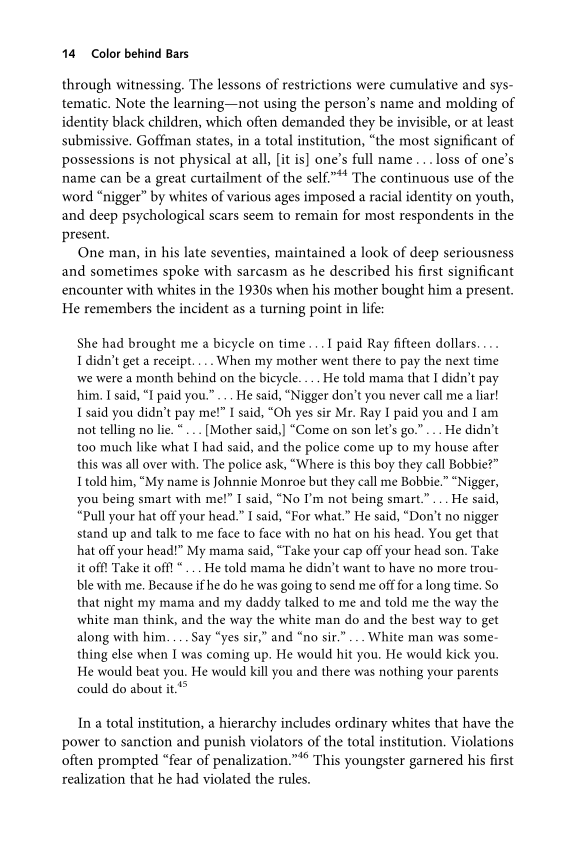through witnessing. The lessons of restrictions were cumulative and sys- tematic. Note the learning—not using the person’s name and molding of identity black children, which often demanded they be invisible, or at least submissive. Goffman states, in a total institution, “the most significant of possessions is not physical at all, [it is] one’s full name . . . loss of one’s name can be a great curtailment of the self.”44 The continuous use of the word “nigger” by whites of various ages imposed a racial identity on youth, and deep psychological scars seem to remain for most respondents in the present. One man, in his late seventies, maintained a look of deep seriousness and sometimes spoke with sarcasm as he described his first significant encounter with whites in the 1930s when his mother bought him a present. He remembers the incident as a turning point in life: She had brought me a bicycle on time . . . I paid Ray fifteen dollars. . . . I didn’t get a receipt. . . . When my mother went there to pay the next time we were a month behind on the bicycle. . . . He told mama that I didn’t pay him. I said, “I paid you.” . . . He said, “Nigger don’t you never call me a liar! I said you didn’t pay me!” I said, “Oh yes sir Mr. Ray I paid you and I am not telling no lie. “ . . . [Mother said,] “Come on son let’s go.” . . . He didn’t too much like what I had said, and the police come up to my house after this was all over with. The police ask, “Where is this boy they call Bobbie?” I told him, “My name is Johnnie Monroe but they call me Bobbie.” “Nigger, you being smart with me!” I said, “No I’m not being smart.” . . . He said, “Pull your hat off your head.” I said, “For what.” He said, “Don’t no nigger stand up and talk to me face to face with no hat on his head. You get that hat off your head!” My mama said, “Take your cap off your head son. Take it off! Take it off! “ . . . He told mama he didn’t want to have no more trou- ble with me. Because if he do he was going to send me off for a long time. So that night my mama and my daddy talked to me and told me the way the white man think, and the way the white man do and the best way to get along with him. . . . Say “yes sir,” and “no sir.” . . . White man was some- thing else when I was coming up. He would hit you. He would kick you. He would beat you. He would kill you and there was nothing your parents could do about it.45 In a total institution, a hierarchy includes ordinary whites that have the power to sanction and punish violators of the total institution. Violations often prompted “fear of penalization.”46 This youngster garnered his first realization that he had violated the rules. 14 Color behind Bars
Document Details My Account Print multiple pages
Print
You have printed 0 times in the last 24 hours.
Your print count will reset on at .
You may print 0 more time(s) before then.
You may print a maximum of 0 pages at a time.
















































































































































































































































































































































































































































































































































































































































































































